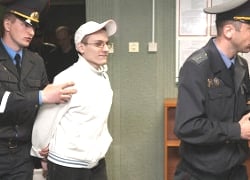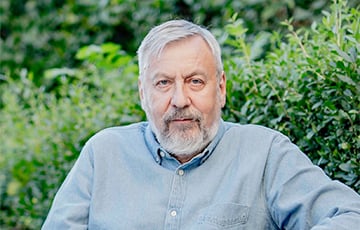EU Representatives informed about new case against political prisoner Dzyadok
3- 24.02.2015, 17:34
- 11,597

Belarusian human rights watchdogs met with representatives of the foreign policy agency of the European Union.
The human rights centre Viasna, informs about the issues discussed at the meeting held on February 24 in the office of the European Commission in Minsk.
At the meeting Belarus was represented by Valyantsin Stefanovich (Viasna human rights centre), Zhanna Litvina (the Belarusian Association of Journalists), Dzmitry Charnou (Belarusian Helsinki Committee), Siarhei Matskevich (Assembly of NGOs), Andrei Yahorau (Center for European Transformation), Dzianis Meliantsou (Belarusian Institute for Strategic Studies), Alena Krasouskaya-Kaspiarovich (Platforma Innovation) and Aliaksei Kazliuk (Center for Legal Transformation Lawtrend). The European External Action Service was represented by Helga Schmidt, Deputy Secretary General for Political Affairs, and Gunnar Wiegand, Managing Director of Europe and Central Asia Department, as well as the head of the EU Delegation to Belarus Maira Mora.
This meeting was held right after the meeting with Lukashenka. As noted by Valyantsin Stefanovich after the meeting, though it was a short conversation, it was enough to discuss major problems of human rights in Belarus with the EU representatives.
“Our dear guests started our conversation with saying that at their meeting with the Belarusian leaders President Lukashenka said that Belarus supports the territorial integrity and independence of Ukraine, but at the same time they discussed issues concerning not only the Ukrainian crisis, but also human rights and democracy in Belarus. Ms. Schmidt, in particular, noted that the EU welcomes the position of the Belarusian authorities towards Ukraine, but it does not mean that they will ignore what is going on in Belarus, as the EU policies have always been based on the value approach in the field of human rights and democracy,” said the human rights activist.
Valyantsin Stefanovich said that human rights activists also support the position of the Belarusian authorities towards the Ukrainian crisis, “but, as it was quite rightly pointed out, this does not mean that we should ignore and not criticize the situation that we have inside the country”.
“I expressed concern that, unfortunately, there are not so many positive aspects and changes that we could mention. That the basic civil and political rights are still rather limited: freedom of association, peaceful assembly, expression. That we are extremely negative, critical of the recent changes to the law on the media,” Stefanovich told about his speech.
When speaking to the EU representatives, the human rights watchdog focused on the issue of political prisoners in Belarus: “I said that we recognize six persons as political prisoners, because there is information that in the European Union they are talking of only three of them. I dwelled on the case of Mikalai Dzyadok, who is expected to stand trial tomorrow in the premises of the Mahilyou prison, and we cannot get there; I reminded that the trial might result in one more year in prison under Article 411”.
Among other acute problems, Stefanovich also mentioned that the Belarusian state still applies the death penalty, that last year human rights activists documented three cases of executions, with one person currently on death row awaiting execution, according to available information. Speaking about the forthcoming elections, he recalled that the OSCE ODIHR recommendations made on the basis of previous observation missions remain relevant, that the Belarusian authorities mainly ignored these recommendations and human rights activists continue to insist on their implementation.










